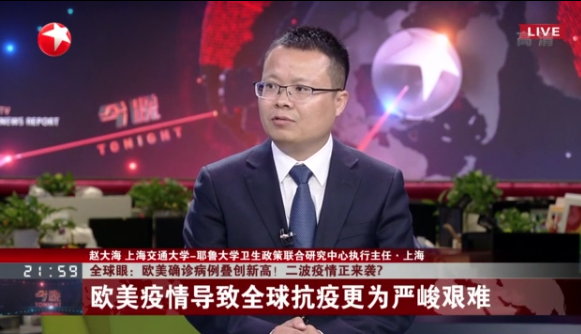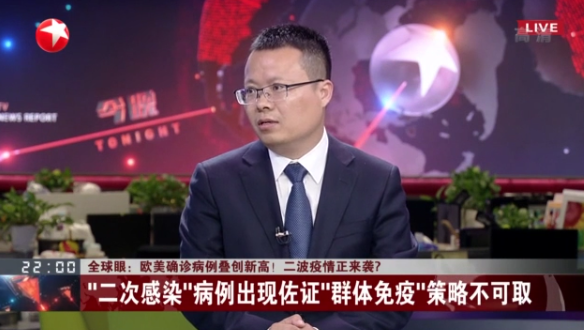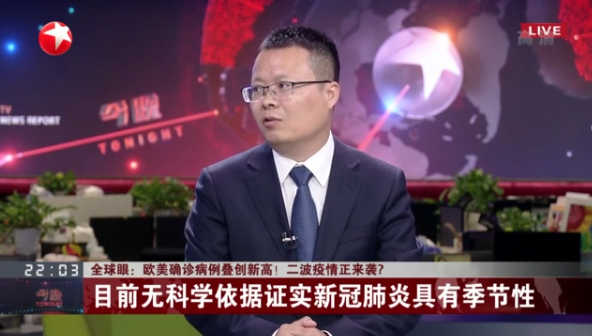上海交大赵大海关于新冠疫情第55次在电视台访谈评论:欧美应采取严格防控措施,不能完全指望疫苗

上海交通大学国际与公共事务学院博士生导师、上海交通大学-耶鲁大学卫生政策联合研究中心执行主任赵大海,自新冠肺炎疫情暴发以来,对于新冠疫情暴发、防控以及医疗卫生体制改革第21次在上海电视台进行访谈评论,也是第55次在央视、上视进行访谈评论。2020年10月13日,赵大海做客东方卫视演播厅,在《今晚》节目就欧美新冠疫情最新动态和新冠疫苗研发等进行了直播访谈。现将访谈内容摘录如下。
主持人:WHO总干事日前称,在新冠流行7个月后,亚洲部分国家由于采取严格的隔离及边境管制,目前生活已接近正常,但欧美国家并非如此。比如,美国由于临近大选,还将疫情政治化,您认为,欧美这波疫情反弹对全球抗疫来说会有何种影响?
赵大海:欧洲的主要国家目前已正式进入了第二波的新冠疫情暴发,美国的疫情一直没有放缓的趋势,一直处于高位的疫情暴发。因此,欧美主要发达国家目前的新冠疫情防控形势是日趋严峻,这就增加了全世界疫情抗击的难度。与此同时,面对第二波的疫情暴发,欧洲主要国家没有采取针对第一波暴发时的严格防控措施。因此,欧美主要发达国家新冠疫情暴发和防控形势给全世界新冠疫情的抗击带来了很大的困难。

主持人:其实欧美主要国家有放任自流的意思。此外我们注意到,"二次感染"且病情加重甚至死亡的病例。这种病例会否成为"第二波"疫情的主要特点?
赵大海:二次感染,目前从全球来看,病例数还不算特别多;而且二次感染死亡的病例,目前全世界只有一例。通过这两个方面来看,目前并没有可靠的证据证明,二次感染会是第二波疫情暴发的主要趋势。
主持人:据世卫组织估算,全球目前仅有不到10%人口对新冠病毒产生一定免疫反应,这是否从侧面证明,所谓"群体免疫"的抗疫策略是有问题的?
赵大海:是的。刚才您提到“二次感染”,二次感染现象和二次感染病例的出现,在很大程度上就已佐证了群体免疫抗疫策略是不成立的,不科学的,也是不人道的。

主持人:有这么一个观点,想看看您的看法,根据西方媒体的说法,随着治疗方法不断完善,新冠病毒将逐步被"驯化",演化为冬季特有疾病。是这样吗?
赵大海:目前并没有科学证据表明,新冠病毒会被驯化,演变为冬季特有的疾病。原因在于,新冠病毒现在已跨越了春夏秋冬四个季节;而且在一些疫情比较严重的国家,譬如美国、印度、巴西,新冠疫情在夏季的时候并没有放缓的趋势。因此,这种说法,我们可以理解为本身是一些国家想放弃或不再采取严格防控措施抗击疫情的说辞或借口而已。
主持人:因此,我们还得要采取严格的防控措施。说到疫情应对,在应对第一波疫情时候,不少国家就已经显得力不从心,医疗资源告急、医院超负荷运转。眼下第二波疫情来袭,多国发出担忧的声音,担心自己撑不到疫苗问世。您怎么看?
赵大海:欧美主要发达国家第二波的疫情暴发已正式到来,而且第二波疫情比第一波更猛烈。在这个前提下,确实很多国家,包括欧美发达国家医疗卫生系统很难有能力满足患者的需求,医疗资源确实出现了紧缺。基于此,到疫苗明年初上市之前,确实应该会有一些国家的医疗卫生系统处于崩溃的边缘。还有一个更重要的问题就是,即便疫苗上市,到明年年底,疫苗的产量依然没有办法满足每一个国家的需要。因此,如果各国不采取严格的防控措施,完全指望疫苗的话,一些国家的医疗卫生系统一定会崩溃。
主持人:所以一方面疫苗能发挥作用,但另一方面防控还是不能松。说到疫苗,一方面我们看到一些疫苗已经可以预约了,但是另一方面,譬如强生公司今天就暂停了新冠疫苗的试验,因为发生了不明原因的疾病。这说明了什么?我们怎么看待这样的信息?
赵大海:现在世界卫生组织称已有十种疫苗处于临床三期的试验阶段。在临床三期的时候,出现疫苗试验的问题,应该是在预料之内的。也就是说,我们本身也没有指望这十种疫苗都能走完这完整的临床三期试验。出现1-2种疫苗走不完临床三期,但总归会有几种疫苗能完整地走完临床三期,真正的上市和批量生产。因此,总体而言,我们对疫苗的预期还是比较乐观的。
供稿者:国务学院
日期:2020年10月14日
Dahai ZHAO’s 55th comments on TV during the pandemic: Europe and the US should adopt strict prevention and control measures and cannot rely entirely on vaccines
Dahai Zhao, a doctoral supervisor at the School of International and Public Affairs of Shanghai Jiao Tong University and Executive Director of Shanghai Jiao Tong University-Yale University Joint Research Center for Health Policy, has been interviewed by ShanghaiTV for the 21nd time (the 55nd time by CGTN / ShanghaiTV) since the COVID-19 pandemic. On October 13, 2020, Zhao commented on the latest developments of COVID-19 in Europe and the US and the development of COVID-19 vaccine on “Tonight” of ShanghaiTV.
Anchor: The Director-General of the WHO recently stated that seven months after the COVID-19 epidemic, some Asian countries have adopted strict isolation and border controls, and life is now close to normal, but this is not the case in European and American countries. For example, the United States is also politicizing the epidemic due to the approaching general election. In your opinion, what impact will the rebound of the epidemic in Europe and America have on the global fight against the epidemic?
Zhao Dahai: Major European countries have officially entered the second wave of COVID-19 epidemics. The epidemic in the United States has not been slowing down, and the outbreak has been at a high level. Therefore, the current situation of prevention and control of the COVID-19 epidemic in major developed countries in Europe and the United States is becoming increasingly severe, which has increased the difficulty of fighting the epidemic worldwide. At the same time, in the face of the second wave of outbreaks, major European countries did not take strict prevention and control measures against the first wave of outbreaks. Therefore, the outbreak and prevention and control of the COVID-19 epidemic in major developed countries in Europe and America have brought great difficulties to the world's fight against the COVID-19 epidemic.
Anchor: In fact, major European and American countries have the meaning of laissez-faire. In addition, we have noticed cases of "secondary infections" that have worsened or even died. Will such cases become the main feature of the "second wave" of the epidemic?
Zhao Dahai: From a global perspective, the number of cases of secondary infection is not particularly large; and there is only one death from secondary infection in the world. Looking at these two aspects, there is currently no reliable evidence that secondary infection will be the main trend of the second wave of outbreaks.
Anchor: According to WHO estimates, less than 10% of the world's population currently has a certain immune response to the new coronavirus. Does this prove from the side that the so-called "herd immunity" anti-epidemic strategy is problematic?
Zhao Dahai: Yes. Just now you mentioned "secondary infection." The phenomenon of secondary infection and the emergence of secondary infection cases have to a large extent proved that the anti-epidemic strategy of herd immunity is untenable, unscientific, and inhumane.
Anchor: I have such a point of view. I would like to see what you think. According to the Western media, with the continuous improvement of treatment methods, the new coronavirus will gradually be "domesticated" and evolve into a winter-specific disease. Is that right?
Zhao Dahai: There is currently no scientific evidence that the new coronavirus will be domesticated and evolve into a winter-specific disease. The reason is that the COVID-19 virus has now crossed the four seasons of spring, summer, autumn and winter; and in some countries with more severe epidemics, such as the United States, India, and Brazil, the COVID-19 epidemic has not slowed down in the summer. Therefore, we can understand this statement as an excuse or excuse that some countries want to give up or no longer take strict prevention and control measures to fight the epidemic.
Anchor: Therefore, we have to take strict prevention and control measures. When it comes to responding to the epidemic, many countries have been unable to deal with the first wave of the epidemic, medical resources are in a hurry, and hospitals are overloaded. Now that the second wave of the epidemic strikes, many countries have voiced concerns, worrying that they will not be able to make the vaccine available. What do you think?
Zhao Dahai: The second wave of outbreaks in major developed countries in Europe and America has officially arrived, and the second wave of epidemics is more violent than the first. Under this premise, it is true that the medical and health systems of many countries, including developed countries in Europe and the United States, are unable to meet the needs of patients, and medical resources are indeed in short supply. Based on this, before the vaccine is launched early next year, there should indeed be some countries whose medical and health systems are on the verge of collapse. A more important issue is that even if the vaccine is on the market, by the end of next year, the output of the vaccine will still not be able to meet the needs of every country. Therefore, if countries do not take strict prevention and control measures and rely on vaccines, the medical and health systems of some countries will definitely collapse.
Anchor: So on the one hand, vaccines can work, but on the other hand, prevention and control cannot be relaxed. Speaking of vaccines, on the one hand, we have seen that some vaccines are already available for appointment, but on the other hand, for example, Johnson & Johnson suspended the trial of the COVID-19 vaccine today because of an unexplained disease. This shows what? What do we think of such information?
Zhao Dahai: The World Health Organization now claims that ten vaccines are in the clinical phase III trial. In the third phase of the clinical trial, problems with vaccine trials should be expected. In other words, we ourselves did not expect these ten vaccines to complete this complete phase III clinical trial. There are 1-2 kinds of vaccines that can not complete the clinical phase three, but there will always be several vaccines that can complete the clinical phase three, and truly go on the market and mass production. Therefore, overall, our expectations for vaccines are still relatively optimistic.
Contributor: SIPA, SJTU
Data: October 14, 2020

